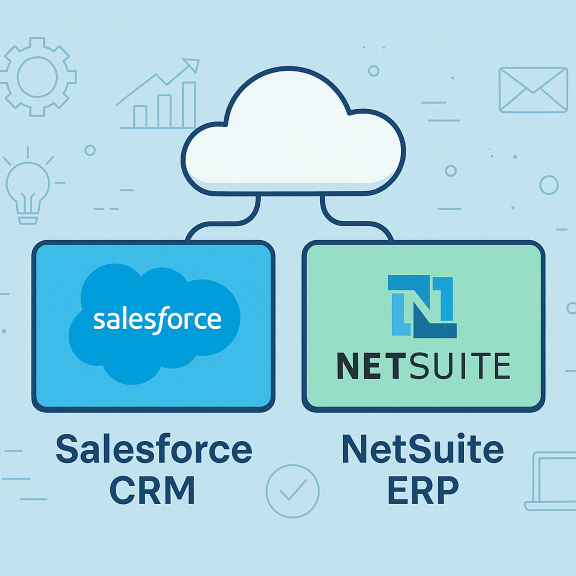Understanding Salesforce Integration with NetSuite ERP

If you want to grow your business with better tools, it’s essential to understand Salesforce integration with NetSuite ERP. This integration combines the best of CRM (Salesforce) and ERP (NetSuite), helping businesses become faster, smarter, and more organized.
In this blog, you’ll understand Salesforce integration with NetSuite ERP in simple terms — what it is, how it works, and why it matters for businesses of all sizes.
🔹 What Does It Mean to Understand Salesforce Integration with NetSuite ERP?
To understand Salesforce integration with NetSuite ERP, you need to know what each platform does.
- Salesforce is a Customer Relationship Management (CRM) tool that manages sales, customers, and marketing.
- NetSuite ERP manages internal business functions like finance, inventory, HR, and supply chain.
When you connect them, you streamline the full business cycle — from lead to cash.
🔹 Benefits You Gain When You Understand Salesforce Integration with NetSuite ERP
- ✅ Real-time data syncing between sales and finance
- ✅ Improved customer service through shared data
- ✅ Eliminate manual data entry
- ✅ Automate the sales-to-cash process
- ✅ Better collaboration between teams
By taking the time to understand Salesforce integration with NetSuite ERP, companies unlock a more efficient, connected system.
🔹 Tools Used to Achieve Salesforce Integration with NetSuite ERP
Here are some tools that make integration easier:
Each of these tools helps you understand Salesforce integration with NetSuite ERP technically by using APIs that sync data between platforms.
🔹 Why Businesses Must Understand Salesforce Integration with NetSuite ERP
Companies today work across departments — sales, accounting, customer service, and operations. When systems are disconnected, work becomes slower.
If you understand Salesforce integration with NetSuite ERP, you can:
- Work from a single source of truth
- Avoid duplication of data
- Make smarter business decisions
🔹 Use Cases to Help Understand Salesforce Integration with NetSuite ERP
Here are some real examples:
- A sales rep closes a deal in Salesforce → data flows directly to NetSuite for invoicing
- A customer updates their profile in NetSuite → changes reflect instantly in Salesforce
- Finance team generates reports using data from both systems
All of this is possible when you truly understand Salesforce integration with NetSuite ERP.
🔹 Summary of Key Points
- 🔄 Sync customer and financial data in real-time
- ⏳ Save time and reduce errors
- 📈 Improve forecasting with connected systems
- 💬 Offer better service with unified data
- ⚙️ Automate tasks like order processing and invoicing
If you want smooth operations, understand Salesforce integration with NetSuite ERP deeply.
Don’t wait to upgrade your systems.
✅ Let our team help you understand Salesforce integration with NetSuite ERP in detail and implement it right for your business.
📞 Contact us today for a free consultation.
